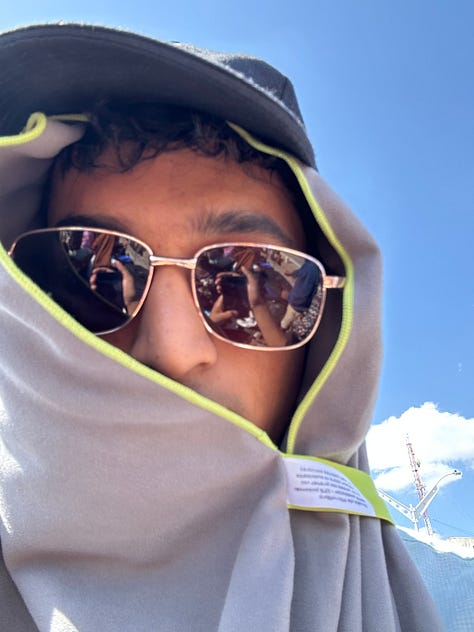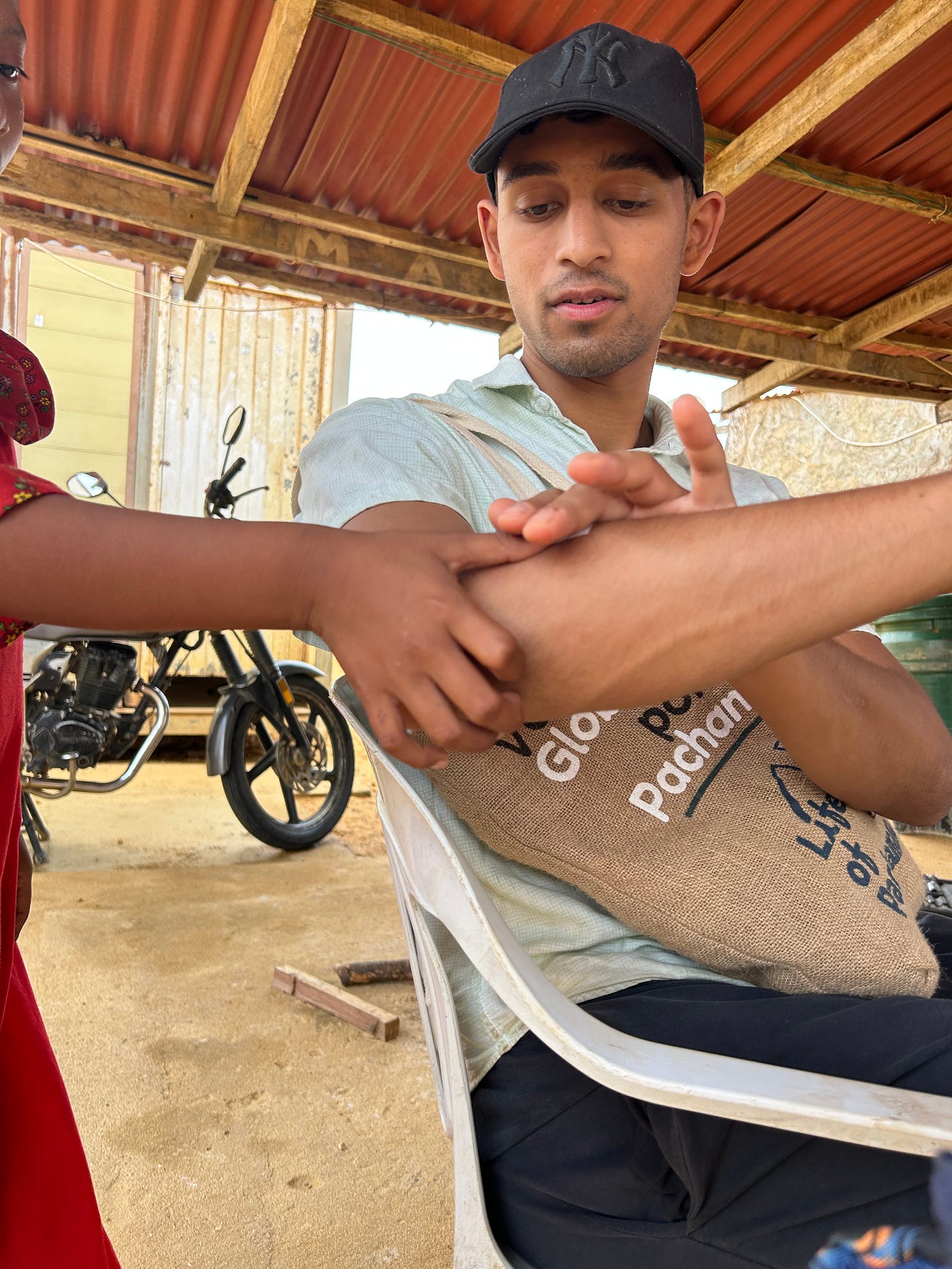Hey everyone, I hope you’re doing well! And if you were a smart insider trader, maybe you earned some money from the whole stock market crash + Tariff debocle (kidding, of course).
This post is a two-parter, with this first informal post taking a more personal approach. What does my life actually look like in the field? Hopefully, this gives you a sneak peak (or too much information).
The easterly winds of la Alta Guajira—Jou’tai in Wayuunaiki—are relentless. They dry clothes and meats in minutes, shape desert dunes, and sting your face with hot sand as they sweep toward the sunset. After nine months of canceled plans, missed messages, and wishful thinking, I finally made it to this region I had only heard about through stories. Here’s what happened.
Packing and Planning
Last year, I met a Wayúu artisan from La Alta Guajira in a event in Riohacha. Like most new contacts, I gave my WhatsApp with the small chance that an opportunity to interview that said person or work with them would come to fruition. (I wish WhatsApp could show your recently added contacts, but I would wager the success rate at 10%).
Then somehow, she reached out to me in February. We got talking about a possible visit to her community, and before I know it, we had a general plan. Two phone calls, a list of over 50 grocery and home items to buy for them (food, diapers, a broom, filtered milk, water, matches, candies, and so on), I had spent the remaining monthly budget on securing what I could for my stay. I must note that for Wayúu people, it is custom to bring gifts, usually coffee, rice, and sugar, when visiting someone.
One day before I left, she sent me a list of 50 more things, some of them incredibly expensive and beyond what I would characterize as necessary. I showed my host mom the list, and she scoffed.
"They want to take advantage of you to buy them all the things they want because you're a foreigner".
I was puzzled. Here I was, a privileged American with the means to buy (although at a sacrifice to my living standards for next month) items for a family that was kind enough to host me in their village, yet also with a sense of pride and uncertainty at what was too much. If the 8 month year old baby needs diapers, I have to bring them, right? But what about forty dollars’ worth of milk? Or twenty liters of water—about fifty pounds?
To my American friends reading this—yes, this probably sounds dangerous.
“Really?! You're just going to go to a random city and
1) try to find the cousin of a person you met once,
2) in a place where people speak more Indigenous language than Spanish,
3) who will supposedly take you to a remote area to where she lives?
"And you're fine with that?”
In short, nine months of working in La Guajira has taught me to say "yes" to any opportunity that arises through family networks to communities. So hell ya.
The Journey
Armed with a duffel full of food, 10L of water, and a mini-cooler with ice and a frozen chicken, I left my home at 9 a.m. I hitched a shared cab to Uribia, and was told by my friend to find her cousin, who would take me.
And somehow, her cousin was there, waiting for me, alongside 50 other people piling goods from the town to take to their territory. After 1 hour of waiting for us to finally leave, I told myself, "I should probably buy more water". After 2 hours of waiting, I told myself, "What am I doing here, as a foreigner who literally knows no one?" By the third hour, I piled onto a the back of a truck bed with a dozen other men, women, and children to head off towards la Alta Guajira.



Vocabulary Lessons and Family Time
I arrived around 7 p.m., famished after not eating all day, my skin coated in dust from the journey. Waiting for me were my friend, her older sister, and her sister’s infant in a small concrete hut, surrounded by stars and the gusts of Jou’tai. And in the midst of this beauty, my fatigue, and my relief, the first thing they told me was:
"Báñate puerco. Sucio, no entres esta casa"
"Wash yourself, you dirty pig, don't step foot in this house".
When I failed to find my left-footed Chaco to go outside and shower, the insults continued: “Imbécil, estúpido, feo, bobo.” You can roughly translate the first two words.
After washing up, we sat on the floor for dinner. And after saying, “Estamos en confianza”—we’re friends here, we’re honest with each other—my tired self nibbled on arepas as her older sister told me the saga of her ex-boyfriends.
And throughout the seven nights I slept there, that first night roughly captured my experience. They treated me like family. Like the way your mom or older sister berates you and treats you like a baby. I was commanded when to shower, when to eat, when to wash dishes and clothes, when to take care of the baby, and when to read the Bible verse before we all slept in our hammocks. I certainly learned a lot of new words—with puerco taking the top spot. And I spent a lot of time in absolute confusion, as they spoke Wayuunaiki amongst themselves between interjections of making fun of me and telling life stories.
As a twenty-three year old living in a foreign country, I have a lot of pride over my independence. So when my personal control, my fragile self-esteem, and my simple lack of experience in doing so many things—such as washing dishes and clothes with two plastic bowls, a little water, and detergent—were challenged “en confianza,” it hurt. When they criticized the food I brought, told me I had forgotten X thing or Y item, I felt like a tool. One morning, my friend left me at home to help take care of the baby with her older sister, and I literally fell asleep as she described a beautiful, “light-skinned, blue-eyed” Argentinian boyfriend she regretted letting go.
I hope that my experience is bringing you second-hand discomfort. Because that’s how I view this intimate voyage into the daily lives of the people I stayed with. That’s the funny, twisted, complicated side of getting to know people as they are—not through polished interviews or their published written work. You realize they’re hilarious, mean-spirited, caring, unwise, hypocritical, and will drive you crazy if you spend too much time with them.
The Gringo and the Fish
One morning, they sent me out to ask for a fish from their cousin who was coming back from his early morning trip. “Follow this path,” I was told. “You can’t miss the boat or the wooden structure on the beach.” Miraculously, in no more than a swimsuit, torn-up shirt, glasses, Chacos, and an empty plastic bag wrapped around my finger, I arrived. As usual, they talked and laughed about me in Wayuunaiki as I struggled to understand. But I completed my mission: a three-pound snapper in my grocery bag. A random cousin offered to drop me off near my friend’s house. I couldn’t say no.
You already know what’s going to happen. I lost the path I originally took to get there. I was a gringo with a fish in the blazing desert sun, walking between snake-filled bushes, hopelessly asking the occasional cousin or uncle walking by where the house was. With only a general sense of direction, I kept going. After twenty minutes, I realized I was lost. After thirty, I began to worry. Time was measured by the sun retreating from the coast into the sky, sweat evaporating from my face, the fish no longer cold from the morning waters. “I’m going to die here,” I told myself. And then, “How funny—imagine if they find a gringo with a fish in these parts.”
Desperate, I resolved to walk to the next house I could find, hoping they’d speak Spanish and could lead me back. I stumbled upon a mud hut—only to realize it was a blind grandma who certainly didn’t speak Spanish. “Shit.” But a second later, I realized I had already met her. I had been here before! After mispronouncing a few words in Wayuunaiki, her nephew kindly walked me to the door.
I was bracing myself for the insults as I arrived. But I got nothing—“That happens to everyone, don’t worry about it.” So you’ll insult me about my clothes being ugly but not about getting lost in the desert?
So Who am I? The Line between Patron and Guest
Obviously, I’m hinting at a tension. There’s my positionality as a foreign guest with money— but also my treatment as a family member (albeit a toddler). On one hand, they expected me to pay for everything—for the toilet paper, the baby’s shoes, even overpriced iced Coca-Colas as we slowly ran out of potable water. And what was I supposed to do? Say no? The government hadn’t paid them for their jobs in three months. They told me they were in hundreds of dollars of debt. And I couldn’t buy a Coca-Cola?
So I bought it.
But how far is too far? What am I supposed to do? I was staying in their house, subject to their rules and rhythms. They could have easily kept me out. But they didn’t. They welcomed me. They even sent their uncle to bring m
e home on his motorcycle. What do I say when they tell me they have $1,500 in debt but spend the money I give them on unnecessary things? Is that paternalistic? Is it even my money?
Ultimately, I didn’t tell them their purchases were wrong. But I did reject their calls to buy more things once I returned to the city.
And what am I supposed to do when they treat me like a little brother, when they trust me, but also when they treat me like a puerco with all their jokes and commands? Am I over-sensitive to feel offended, and do I need to adapt to my circumstances? Or do I need to establish boundaries?
I had rarely thought seriously about positionality—my role, my responsibilities, and my rights—before this trip. And I still don’t know what to think. Because in the days following my return, they’ve continued their insults over WhatsApp. But they’ve also told me they’ve missed me dearly and are so grateful I came.
There’s a deep complexity in being welcomed with affection and mocked relentlessly. I’m still figuring out if that’s hospitality in its truest form—or if it was just hazing.
Maybe the hardest part of fieldwork isn’t the heat, or the language barrier, or even the insults. It’s living in the discomfort of being both insider and outsider, guest and wallet, brother and foreigner. I don't have clean answers—but maybe that’s the point.






Fantastic read and takeaways. Glad you’re doing well Rishab.
Fantastic read and takeaways. Glad you’re doing well Rishab.